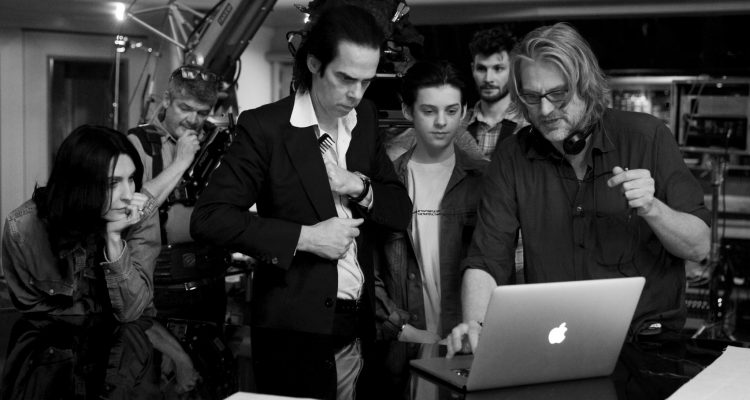Imagine a friend of yours had an unimaginable trauma occur. Imagine he asked for your help, not with the thing itself, which will forever be out of reach, but with something else — a creative project. Imagine the project he proposed, which would require him to probe the darkest corners of his life, was risky in many other ways, too, and that by placing it in your hands, your friend was placing in you a trust so immense it could have felt like a burden.
Just months after the death of his 15-year-old son, Arthur, from a fall from the cliffs near his home in Brighton, Nick Cave was due in the studio to record his album Skeleton Tree — an endeavor, it is hinted during the stunning documentary “One More Time With Feeling” which is in limited re-release at the moment, that felt simultaneously pointless and oddly vital. Cave, quailing at the thought not of making the record, but promoting it and having to talk about and around his grief to journalists and PRs, instead thought that a film about the recording might serve that purpose instead.

In that context, it’s easy to understand why Cave might have asked his friend and erstwhile collaborator Andrew Dominik (Cave and Warren Ellis wrote the brilliant score for Dominik’s masterpiece “The Assassination Of Jesse James By The Coward Robert Ford“) if he would consider taking on the project. It’s not quite so obvious, however, that Dominik, neither the most prolific of filmmakers nor a documentarian by nature, would take it on. So why did he say yes? “I couldn’t conceive of saying no,” Dominik tells me by phone from LA, his Kiwi-inflected voice warm despite the tinny transatlantic line and three-second delay. “I really felt for Nick and Suzy [Cave’s wife, Arthur’s mother], and what you’re confronted with is a feeling of helplessness. This gave me something to do — there’s a will to action in a tragedy. And that’s what a friend is: It’s someone who lets you help them. So it was an act of friendship on his part.”
But Dominik-the-friend and Dominik-the-director must have had slightly different agendas — the former being to support Cave in whatever way possible, but the latter being to make a film that could stand up alongside Dominik’s short but stellar filmography to date: “Chopper” (2000), ‘Assassination’ (2007), “Killing Them Softly” (2012). Dominik acknowledges that immediately: “Then again, for me Nick is a significant artist. I think he’s one of the greats, and where are you going to get an opportunity to have someone like that be willing to expose themselves while going through something unimaginable? It was terrifying: I’m responsible emotionally, I’m responsible financially — because he’s paying for the film — I’m responsible creatively. There’s a lot of ways to fuck it up. But there was also a real opportunity to do something unique. And I think I knew that.”
READ MORE: The 100 Best And Most Exciting Directors Working Today
Perhaps, as much of an outlier as it seems, there is a commonality between the documentary and some of his previous work, and even his long-mooted adaptation of Joyce Carol Oates‘ “Blonde,” which he hopes to make next but is in “a fragile state” right now. I ask if he is consciously drawn to stories, like those of Aussie Mark “Chopper” Read, Jesse James, or Marilyn Monroe, in which a famous/notorious person is both victim and architect of the myths their fame cultivates. “Perhaps, perhaps. I do like biographies, and I am fascinated by people who have divided selves,” he says. “I think we all have a private/public self; the famous just have it in a more extreme fashion and they also deal with other people’s projections. When you love someone, you project fantasies onto them; we do it all the time. But with the famous, it’s more extreme, and I guess that’s my attraction — it’s an illustration of the human condition, but it’s exaggerated. ‘Blonde,’ if it happens, is basically a film about the unconscious overwhelming the rational self. The idea behind it to show her childhood drama, and then show the ways that drama completely undermines the adult’s life — how, at the same time, a person can be two people.”

It seems evident that Cave’s grief has heightened the notion of the divided self even further, but even as a film, “One More Time With Feeling” is many things at once: a hybrid of performance doc, artist biopic and grief movie. Yet it’s also an innovative art film in its own right, mostly black and white, and shot using a special 3D camera rig that, despite the floaty, free, inquisitive effect it gives, was a massive, cumbersome device, one that Cave is drolly dubious about in the film. But Dominik’s belief is that “it’s difficulties that really reveal truth” and “the presence of the camera and difficulties of the camera revealed a certain kind of truth. For one thing, you see how ridiculous it is to try to get Nick to ‘perform’ for it: He doesn’t have the patience.”
He’s referring to the very opening, which, like much of the film — lest we give the impression it’s all doom and sorrow — is funny and scathing and self-aware. It’s the only time we see Dominik himself, caught trying to reset a scene while Benoît Debie (who shot the film with co-DP Alwin H. Küchler) tries to maneuver through a too-small doorway. Cave’s laconic voiceover observes the proceedings, including himself, with wry exasperation that is undercut with something else: an echo of some enormous effort of will in his voice, like he’s trying to find a reason that he’s doing this — any of it. That undertone, however, changes as the film progresses and as more of Cave’s loss is made explicit — reflecting, says Dominik, the experience of shooting.

